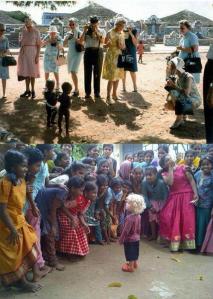This Youtube video has received a lot of praise on my Facebook timeline, and it is not surprising. The message and moreover, the way this message is delivered, indeed deserve ample praise. The message is simple yet inspiring and appropriate, and its delivery is unique and well, yes, genius. Actually, I’m more impressed with how the illustrator has managed to draw so intricately yet so simply, than the actual lecture philosopher Roman Krznaric is sharing with us.
Let me begin by saying that I wholeheartedly agree with Krznaric’s message. Empathy and Outrospection seem concepts simple enough to think of and carry out, yet we are often so involved in our own petty lives that, at the end of the day, we consider them as luxuries we just cannot afford. Yet in a world so connected as ours, empathy is indeed necessary. The political decisions made by one country can affect the region of the world you’re living in and the social decisions made by the government towards one certain group of population may also affect your daily life. Just because you’re a woman living in Korea, and therefore without the possibility to be drafted to the military, you shouldn’t be indifferent to the war in Iraq. You may brush off any effort from the LGBT community to have their voices heard because you’re straight but your good friend or your child may be included in that community. The fact that you can easily buy that new pair of shoes at Nike shouldn’t make you indifferent to the harsh conditions workers in sweat shops face everyday.

Putting ourselves in others’ positions, being curious about others.
So, yes, empathy should be a ‘part of your life’, not just because you’re part of the vast web that is humanity, but also because you can transform that ‘curiosity’ into a radical change and a social change the world desperately needs. Understanding somebody else’s worldview, getting rid of your prejudices and labels, will take you further than you might think, but will also be harder than you think, for often times, the ideas you make of others are so deeply impregnated within you it is just hard to even perceive them, let alone, shake them off.
But once you start being curious about how others live, how they feel, how they deal with their difficulties, that first step can be the start of a significant change. The example mentioned in the lecture, ‘The Parents Circle‘, is a great example. In a region overwhelmed by hatred, death and what seems unshakable prejudice, Israeli and Palestinian parents have managed to come together to share the one thing they have in common, the tragic loss of their loved ones. While governments have been busy with the ‘peace talks’ and negotiations reaching nowhere amidst countless trips in what I can only imagine in first-class, this grassroots movement has managed to start off from somewhere very simple and basic, feeling empathy towards one another across the border in their sadness.

The Parents Circle is a grassroots movement uniting Israelis and Palestinians who have lost immediate family members in the conflict. Reconciliation, education and personal exchanges form the core of this movement.
Fortunately, unlike the 1780s when slavery in the UK was accepted as a norm and magnanimous efforts had to be made by a handful of brave people to fight it off, today, in the 21st century, we have more tools to develop empathy. An inspirational video will literally go around the world in a matter of hours through a simple click. Talented people will use videos, photographs and other tools to spread an idea across the globe and people in our nearby surroundings will talk about it the next day. Social movements are no longer geographically limited, they will be repeated in various regions of the world and people will feel a strong connection with whoever participates in the same demonstration, even if they may be miles apart. 2012 has seen quite a number of such ’empathetic moments’, such as the KONY 2012 movement and the Occupy Wall Street movement, just to mention a couple.
Nevertheless, on the other side of this coin of intense social networking and empathy, we face an unfortunate yet unmistakable ‘lack of action’. Type ‘KONY 2012’ on Google, and the articles you will now see are titled ‘Remember Kony 2012? Well, it’s 2013. What happened?‘ or ‘Whatever happened to Kony 2012?‘. Because we are so easily connected and so easily affected by what happens at the other end of the world, it has become just as easy to create an instant ‘internet sensation’ that will be the center of our conversation for perhaps a week, decorate our Facebook timeline with ‘wise’ comments and even make us spend a few bucks to contribute to the effort in question. But just as instant and sudden that social movement caught our attention in the first place, it will quickly fade away to the margins of our conversation, become vague recollections in our memory and that will be it.

The remains of this Kony package, which I so proudly purchased, now amount to a single sad poster on the wall of my bedroom.
Empathy is undoubtedly the first step to make, and like all first steps, it will be the most difficult one, the most significant one, and will easily become meaningless if it is not followed by second, third, fourth and so on steps. I’m not saying that Krznaric is wrong in encouraging and preaching for empathy and outrospection. On the contrary, I fully support his claim. That is exactly where we should start. I’m just wary and cautious of the easy trap we can fall into, especially in our generation. Unless you’re a psychopath or severely damaged ‘inside’, it is easy to ‘feel’ empathy at the sight of starving children on your Facebook wall. It is easy to ‘click’ on the ‘Like’ button and the ‘Share’ button to prove to the world you are a human being, that people should be aware of this and that something needs to be done. God knows I’ve done it myself countless times.

Yes, we ‘sooo’ care about other people. It all depends on how you define ‘care about’.
What is not easy is to make that empathy endure and to ‘act’ upon it. I’m not saying that we should all leave the comforts of our home and be martyrs or saviors and venture in the heart of some unknown country to ‘save’ those in need. That would be very hypocritical of me. What we need is a specific or even just a potential plan that can easily follow that first wave of empathy. What should we do once we’ve raised awareness? What are some concrete things to do? It doesn’t need to be something grand. But it needs to be more than just a gathering of frustrated people. It needs to be more than taking pity on those we think need to be helped.
That is one thing I am a bit dubious when it comes to the ‘Empathy Museum’ the author proposes. Yes, once again, it is honorable and ingenious to come up with such an idea, to have people go through the experiences others go through so that they can be more empathetic. The ‘Empathy Museum’ will satisfy and nurture your curiosity and allow you to ‘feel’ the lives and problems of others.

The Empathy Museum.
It is a good first step. However, there is a possibility that it can easily remain what it is, a simple ‘museum’. And museums are places you go to experience something new, but you stay within the boundaries of that specific space. The ‘Empathy Museum’ should allow us to carry that momentary experience out of its walls, to make it part of our daily life, so that it can be the motivation for a collective movement. Obviously, I don’t have the answers to how this should be done (otherwise I wouldn’t be a currently partly employed -nearly- 30 year old being daily frustrated at grad school rejections). It’s a simple concern I wanted to voice, so that we don’t end up being like the picture below and move on in our lives nonchalantly, after that limited feeling of empathy.


One thought on “Empathy and its ‘dangers’ – a response to Roman Krznaric”